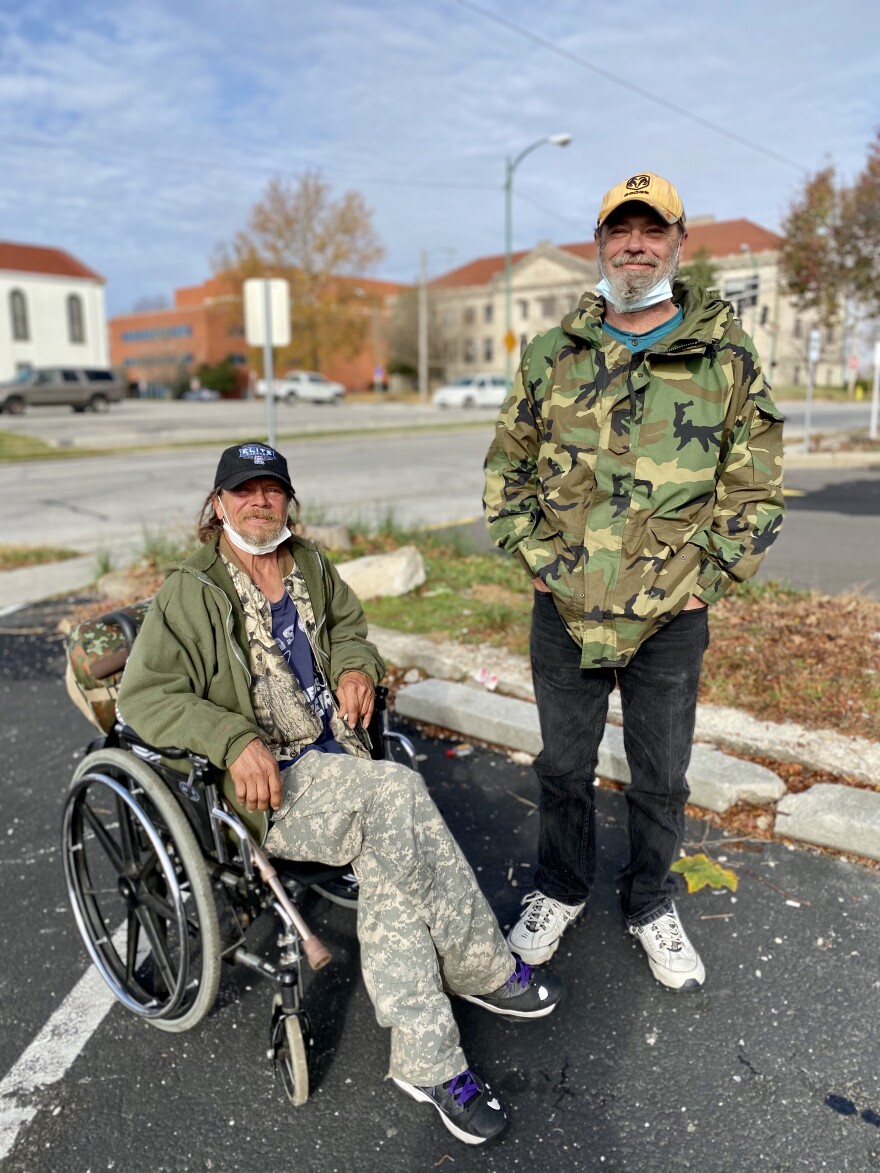So far, Springfield has managed to avoid an outbreak of COVID-19 in its homeless shelters. Not every city can say that. For example, San Diego and Colorado Springs are both dealing with outbreaks in shelters this week.
“We've been very fortunate. We haven't seen an outbreak in our population,” said Adam Bodendieck, the director of homeless services at Community Partnership of the Ozarks, which administers the local Continuum of Care mandated with orchestrating help for the homeless.
“Luckily, our partners, I think, jumped really quickly on instituting various health and safety measures,” Bodendieck said.
Bodendieck said there have been a couple of scares which led to some fancy footwork by the health department and partners.
“They were able to get testing sites set up wherever it looked like there was potential spread and very quickly get anybody who needed to be tested, tested,” he said.
Bodendieck and CPO have been busy with the gargantuan logistics of identifying and finding homeless residents at high-risk for COVID complications and getting them into motel rooms—paid for largely with CARES Act money and donations.
Potential reasons why Springfield's homeless haven't seen an outbreak

Springfield is home to several longer-term shelters where families or people recovering from addiction can find stability for more than just a few nights. One of the largest is run by Victory Mission, where Jason Hynson is executive director. Hynson says his organization's pandemic efforts, like stopping some meals and free showers to unsheltered individuals, have probably helped slow the spread.
Read our earlier reporting on the reduced capacity in Springfield's emergency shelters here and the lack of hygiene resources for the homeless here.
Hynson also wonders if the unsheltered have, in general, avoided the coronavirus because they tend to have stronger immune responses to new viruses.
“And I think part of it is because the majority of them are outside. And I also think that a lot of them are pretty, pretty tough. I mean, if you're living on the streets and you're making it, I think your immunity is high,” Hynson said.
The people walking Springfield streets have their own theories, and that's a popular one. Angela Smith lives in a tent in west Springfield.
“As far as the illness goes, no, it's not really affected many of the homeless people that I know. I think it's because we're out in the elements all the time. We actually have a decent immune system because we don't use the hand sanitizer on a regular basis. We don't use all these different things that they're telling everybody that they need to use in killing all the good germs—as well as the bad germs,” Smith said.
But even people with strong immune systems can get—and spread—the coronavirus.
And the Centers for Disease Control and Prevention, or CDC, says while the homeless might be outdoors more frequently than the general population, they still have several COVID-19 risk factors. For example, a lack of housing contributes to poor health outcomes. And many homeless people are older or have underlying medical conditions like COPD.
What happens when a homeless person tests positive
Health experts say this is no time for shelters to let their guard down.
Chris Rice oversees operations at the Veterans Coming Home Center in downtown Springfield. He's worried, with COVID spreading rampantly now, that there's not a clear plan for homeless people who get the disease locally. Rice said the small handful of individual homeless cases Springfield has seen were met with confusion and nowhere for the COVID-positive person to go. One woman in particular comes to mind, Rice said.
“She was positive for COVID, recently homeless, knew nothing about this new system, and was wondering what we could do to help. And because she was positive for COVID, we had to tell her that, ‘You can't come here,’ and that, ‘You have to get a negative test.’ And all she could say was, ‘Well, where am I supposed to go?’ Those questions are the same since March and we still haven't found the answers to them,” Rice said.
Katherine Wall, a spokeswoman for the Springfield-Greene County Health Department, says there is a facility designated to become an emergency shelter if there's an outbreak among the unsheltered community: the old Doling School building on West Atlantic Street.
But that's only in the event of an outbreak. And in public health, Wall said an outbreak is defined as more cases of a disease than officials would expect—in this case within a particular group.
“So, for instance, if we had two cases in the unsheltered community, but there are a couple that wouldn't be unexpected. It's not as simple as a set number,” Wall said in an email.
Wall said the health department has had success in finding homeless individuals a place to stay after testing positive, either through traditional shelters or hotels.
Word on the street: COVID is a hassle
William Still is homeless. He says he's had a coronavirus test swab stuck up his nose more than a dozen times. That's because for about four months this year, he served time in the Greene County Jail, another very high risk place for outbreaks of a respiratory virus.
Still has avoided the coronavirus so far. And he said the word on the street is: don't get the virus because of the hassle.
“If you test positive, they want you to quarantine yourself for two weeks. And if you're homeless, there's nowhere to quarantine yourself. There's no way to get food. There's no way to do anything if you quarantine yourself,” Still said.
Homeless advocates say they believe clamping down so severely on shelter space and access to hygiene facilities—without finding alternate solutions—has in effect, traded one bad thing for another. Springfield has avoided the catastrophe of an outbreak in a homeless shelter so far. But at what cost, they ask?



